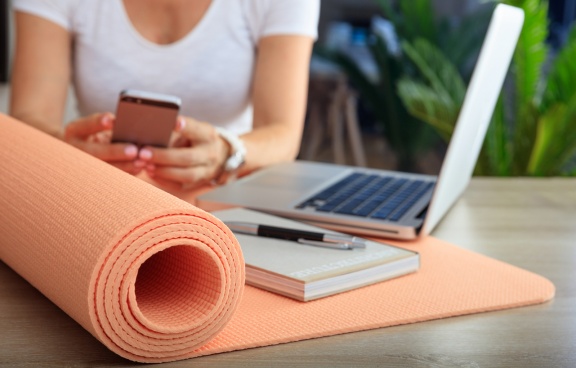Managing a remote workforce can have its challenges, but it also creates a unique opportunity to positively affect the health of your workforce where it starts—in the home. While your employees are sheltering and spending more time in their homes, Vanderbilt Health Employer Solutions has assembled tips and tricks from national experts here at Vanderbilt and across the country to help you build healthy habits among your employees to strengthen them mentally and physically now and into the future.
By sharing this information with your workforce, you can help your employees develop new stress management skills, discover new ways to be physically active, and learn healthier recipes and ways to prepare meals. As a trusted source of information, you can also arm them with resources to make lifestyle adjustments and mitigate habits that put their health and happiness at risk.
Here are seven strategies for lowering anxiety and making a few lifestyle changes that can lead to a healthier home and more enjoyable life regardless of circumstances.
1. Recognizing and reducing stress: It’s undeniable that we’re all working under higher levels of stress and anxiety, which can lower metabolism, impair cognition and suppress the immune system, among other consequences. That was the message from Vanderbilt University Medical Center (VUMC) mental health professionals during April 2, 2020 VUMC Ground Rounds. Panelists offered the following strategies for combating and mitigating some of the common effects of prolonged stress:
- Jennifer Blackford, PhD, director of the Division of Psychology in the Department of Psychiatry and Behavioral Sciences, discussed the complex neurobiology of anxiety, zeroing in on the sustained period of stress caused by COVID-19. She advised the development of positive coping mechanisms—such as learning guided relaxation techniques and maintaining good exercise habits—to lower heightened stress reactions. (Negative strategies for dealing with feelings of anxiety and isolation—such as drug use or excessive drinking or tobacco use—are counterproductive.)
- Lindsey McKernan, PhD, assistant professor of Psychiatry and Behavioral Sciences, advised not to ignore our normal feelings of fear, but instead focus on the “here and now” as a way of moving through emotions and getting to a more relaxed state.
2. Cultivating a sense of purpose: The thought of “joy in work” seems like a luxury right now, but the Institute for Healthcare Improvement argues that finding a reason to do our work helps sustain us in times of stress. Among the suggestions for sparking joy and fulfillment in these uncertain times: Maintain a strong sense of teamwork, show how your work is making a difference, and create a psychologically safe environment for asking questions and giving respectful feedback.
3. Boosting workspace comfort: For remote workers who might not have proper ergonomics in mind, Employee Benefits News recommends the following tips for making your workspace more productive and pain-free:
- Perfect your posture. Work on aligning your elbows and wrists, supporting your lower back in your chair, and making sure your computer screen is at eye level.
- Move more. Set an alarm to remind you to move positions and go for a quick walk around the house.
- Stretch! No one’s looking, so why not take a break for a stretch or an easy yoga move such as child’s pose.
4. Shopping safely: Though there’s no evidence that transmission of COVID-19 happens through eating, staying safe while grocery shopping is top of mind for all. An April 9, 2020, article in JAMA co-written by VUMC’s David Aronoff, MD, director of the Division of Infectious Diseases, offered the following recommendations:
- Wear a cloth mask to reduce your risk of infection and encourage others to stay socially distant.
- Disinfect shopping carts and baskets.
- Before leaving the store or while waiting in the checkout line, use hand sanitizer if available.
- If using a disposable grocery bag, discard it once you are home; reusable bags can be stored for later use.
- After unpacking your groceries, wash your hands with soap and water for at least 20 seconds (or use hand sanitizer that contains at least 60% alcohol) and wipe surfaces with household disinfectants registered with the Environmental Protection Agency.
And don’t forget to counteract the dreaded “COVID hands”—caused by excessive hand washing and sanitizing—by moisturizing often and following this advice from Jami Lyn Miller, MD, assistant professor of dermatology.
5. Promoting healthier meals: The My Vanderbilt Health website offers a large menu of nutritious recipes to mix up the meal routine and some healthier substitutions for southern food favorites. And for those employees with younger “coworkers,” the site also offers advice for cooking with kids and keeping their snacks simple but healthy.
6. Curbing emotional eating: For employees working from home, being so close to a refrigerator and pantry can wreak havoc on good eating habits. Compound that proximity to food with the stress of the coronavirus, and you’ve got a recipe for overeating. A My Vanderbilt Health article by Chad Buck, Ph.D., a clinical psychologist with Vanderbilt Work/Life Connections, explains that “focusing mental energy on food distracts us from what we are feeling or prevents us from facing feelings.” The article helps distinguish between physical and emotional hunger, offers an emotional eating quiz, and points to several ways to manage the desire to overeat when anxious.
7. Finding alternate ways to exercise: For employees bemoaning gym closures, why not encourage yoga, walking and at-home fitness—good routines to add to the exercise arsenal that don’t violate social distancing rules. My Vanderbilt Health has a bevy of ideas—check out its:
- Infographic on yoga poses that build strength.
- Article on the benefits of walking, which is good for the waistline and offers mental health perks, too.
- Suggestions for ways to work up a sweat at home, such as high-intensity interval training.
Please reach out if we can help you carry these messages forward to your workforce.
